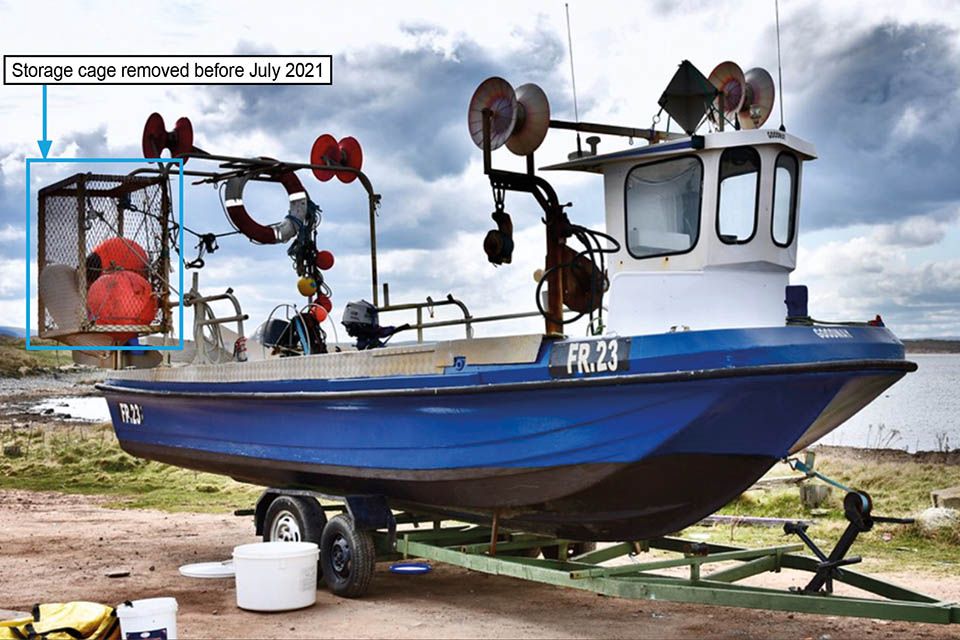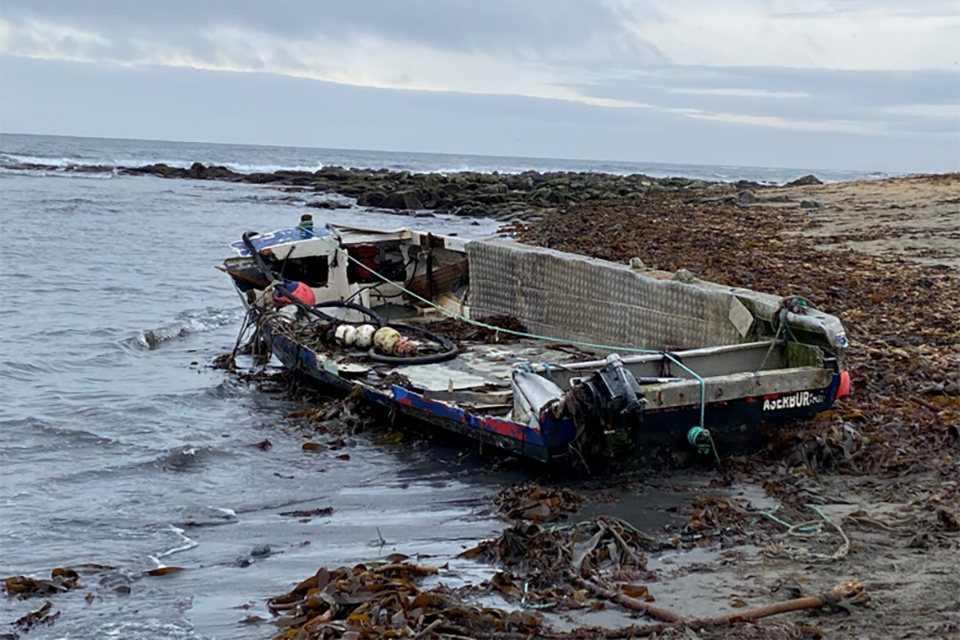Safety flyer to the fishing industry - Goodway
Published 22 September 2022
1. Summary
Capsize of the single-handed creel fishing vessel Goodway (FR23), with the presumed loss of one life, near Cairnbulg, Scotland, on 16 October 2021

Figure 1: Goodway
2. Narrative
At 1140 on 16 October 2021, the 6.85m creel fishing vessel Goodway (Figure 1) left Cairnbulg harbour, Scotland, to work creels locally. The owner was the only person on board. At 1340, the owner’s mobile phone suddenly disconnected from the network and it is highly likely that Goodway capsized at that time, while the owner attempted to free creels that had become fast to rocks on the seabed. At 2018, a concerned family member alerted the coastguard that the vessel was overdue and the RNLI and coastguard helicopter assets were immediately tasked to search for both Goodway and its owner. At 2233, a coastguard helicopter found Goodway’s upturned hull anchored to rocks by a snagged fleet of creels that were attached to a cleat on the starboard side of the vessel. The hull was briefly inspected before being freed from the rocks by the tide and washed ashore, where it was turned over and thoroughly examined (Figure 2).

Figure 2: The wreck of Goodway washed ashore on Cairnbulg Point
The evidence indicated that the owner had attached the back rope of the snagged fleet of creels to the cleat on the starboard side of his vessel. It is likely that Goodway capsized when the owner used the outboard engine, which was offset to port, to drive the vessel forward in an attempt to free the fleet. It is presumed that the skipper fell overboard when Goodway capsized and he was unable to board the upturned hull or send a distress alert. It is unknown if the owner was wearing a personal flotation device (PFD) or carrying his recently purchased automatic personal locator beacon (PLB) at the time of the accident, as he has not been found and no alert was received from his PLB. Goodway was not fitted with a float free Emergency Position Indicating Radio Beacon (EPIRB) and the PLB purchased by the owner did not operate on the 406 megahertz (MHz) frequency required to transmit a distress alert to the coastguard.
3. Safety Lessons
-
The Maritime and Coastguard Agency does not recommend single-handed fishing operations due to the risks involved: there is no one to raise the alarm or help recover you if you fall overboard.
-
There must be a means of reboarding the vessel or climbing onto an upturned hull from the water. A boarding ladder or tyres rigged down the vessel’s side can improve a fisherman’s chances of survival.
-
The ability to send a distress signal from the water could save a life. Many types of PLB are available on the market and fall into two distinct groups: 406MHz and AIS. A single-handed fishing vessel must carry a 406MHz PLB if it is not fitted with an EPIRB. This is the only frequency that operates on the global satellite alerting network and, when manually operated, can immediately transmit an alert. To be effective in an emergency situation, a PLB must be fit for its intended purpose. It should be attached to a PFD and its user should know how to activate it.
-
PFDs save lives, once the emergency services have been alerted to your distress, you need to float to live until they reach you. Wearing a PFD will keep you afloat to enable you to be rescued.
Our accident investigation report is available at: https://www.gov.uk/maib-reports/capsize-of-single-handed-creel-fishing-vessel-goodway-with-loss-of-1-life.
Extract from The United Kingdom Merchant Shipping (Accident Reporting and Investigation) Regulations 2012 – Regulation 5:
The sole objective of the investigation of an accident under the Merchant Shipping (Accident Reporting and Investigation) Regulations 2012 shall be the prevention of future accidents through the ascertainment of its causes and circumstances. It shall not be the purpose of an such investigation to determine liability nor, except so far as is necessary to achieve its objective, to apportion blame.
Note:
This safety flyer is not written with litigation in mind and, pursuant to Regulation 14(14) of the Merchant Shipping (Accident Reporting and Investigation) Regulations 2012, shall be inadmissible in any judicial proceedings whose purpose, or one of whose purposes is to attribute or apportion liability or blame.
Marine Accident Investigation Branch
First Floor, Spring Place
105 Commercial Road
Southampton
SO15 1GH
Email iso@maib.gov.uk
Enquiries during office hours +44 (0)23 8039 5500

